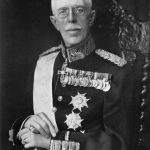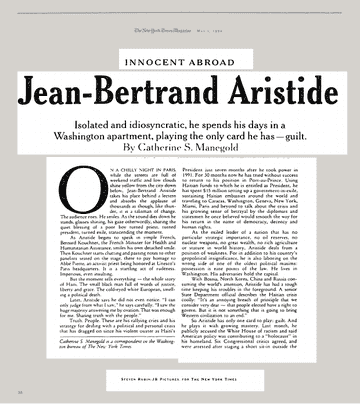
8: Colonial Rule in West Africa
wasscehistorytextbook.com/8-colonial-rul…
History Textbook
West African Senior School Certificate Examination
(continued 2/6)
Soon a struggle between the Anna Pepple House and Manilla Pepple House led to the outbreak of civil war in Bonny in 1869.
wasscehistorytextbook.com/8-colonial-rul…
History Textbook
West African Senior School Certificate Examination
(continued 2/6)
Soon a struggle between the Anna Pepple House and Manilla Pepple House led to the outbreak of civil war in Bonny in 1869.

The war resulted in King Jaja’s migration and founding of the inland kingdom of Opobo which lay in the palm oil producing hinterland.
Jaja was an avowed nationalist and determined to control the trade in his political domain.
Jaja was an avowed nationalist and determined to control the trade in his political domain.

He was determined to prevent European incursions into the interior.
He also wanted to ensure that Opobo oil markets remained outside the sphere of foreign traders.
To this end, King Jaja signed a trade treaty with the British in 1873.
He also wanted to ensure that Opobo oil markets remained outside the sphere of foreign traders.
To this end, King Jaja signed a trade treaty with the British in 1873.

Part of the treaty reads as follows:
After April 2, 1873, the king of Opobo shall allow no trade established or hulk in or off Opobo Town, or any trading vessels to come higher up the river than the Whiteman’s beach opposite Hippopotamus Creek.
After April 2, 1873, the king of Opobo shall allow no trade established or hulk in or off Opobo Town, or any trading vessels to come higher up the river than the Whiteman’s beach opposite Hippopotamus Creek.

If any trading ship or steamer proceeds further up the river than the creek above mentioned, after having been fully warned to the contrary, the said trading ship or steamer may be seized by King Jaja and detained until 

a fine of 100 puncheon [of palm oil] be paid by the owners to king Jaja . . .
By signing the treaty, the British acknowledged Jaja as the king of Opobo and dominant middleman in the Niger Delta trade.
However, the ensuing scramble for Africa of 1880s upset the understanding.
By signing the treaty, the British acknowledged Jaja as the king of Opobo and dominant middleman in the Niger Delta trade.
However, the ensuing scramble for Africa of 1880s upset the understanding.

The British merchants and officials were no longer in the mood to respect Jaja’s preeminence in the Niger Delta hinterland.
They instead penetrated the hinterland to open up free trade and therefore a confrontation with Jaja became inevitable.
They instead penetrated the hinterland to open up free trade and therefore a confrontation with Jaja became inevitable.

In 1887, the British consul Harry Johnson enticed Jaja to the British gunboat for discussions; but then exiled him to West Indies where he died in 1891.
Military Confrontation
Some decentralized West African societies equally resisted European penetration.
Military Confrontation
Some decentralized West African societies equally resisted European penetration.

The Baule of Ivory Coast and Tiv of Nigeria stiffly resisted colonial occupation.
The Baule fought the French from 1891-1911. The Tiv fought the British from 1900-30; and Igbo resistance was particularly widespread and prolonged.
The Baule fought the French from 1891-1911. The Tiv fought the British from 1900-30; and Igbo resistance was particularly widespread and prolonged.

Because of the egalitarian nature of their society, the British found it extremely difficult to subjugate them.
The British literally had to fight their way from Igbo village to village, from town to town,
The British literally had to fight their way from Igbo village to village, from town to town,

before they could finally declare their imperial authority over the Igbo people.
Igbo elders challenged the British imperial penetration and invited the British to: “Come and fight: if you want warm, come, we are ready.” The British waged wars from about 1898-1910.
Igbo elders challenged the British imperial penetration and invited the British to: “Come and fight: if you want warm, come, we are ready.” The British waged wars from about 1898-1910.

While West Africans fought gallantly against their European intruders; everywhere but Ethiopia, the Europeans were triumphant.
European Political Policies in their West African Dominions
The British in West Africa
European Political Policies in their West African Dominions
The British in West Africa

The 19th century British colonial policy in West Africa was a policy of assimilation.
Their grand plan was to have Africans assimilate into European civilization and culture.
The policy created a western class of black Englishmen who were supposedly
Their grand plan was to have Africans assimilate into European civilization and culture.
The policy created a western class of black Englishmen who were supposedly

British partners in religion, trade and administration.
These African “British men,” especially Creoles, rose in colonies of Freetown, Bathurst, southern Ghana and Lagos to important positions in the church, commercial firms and the colonial government.


These African “British men,” especially Creoles, rose in colonies of Freetown, Bathurst, southern Ghana and Lagos to important positions in the church, commercial firms and the colonial government.



However, with the growth of European racism, western educated Africans (elites) found that they were increasingly discriminated against in administration.
The British now imported European administrators to fill positions previously held by Africans.


The British now imported European administrators to fill positions previously held by Africans.



Western educated Africans like the Creoles were even forced out of the civil service.
In 1910, the British colonial office expressed the opinion that Englishmen naturally expected to enjoy fruits of their conquests, therefore they should be preferred
In 1910, the British colonial office expressed the opinion that Englishmen naturally expected to enjoy fruits of their conquests, therefore they should be preferred

over Africans in senior positions.
The problem however was that there were not enough Englishmen prepared to serve as colonial administrators in Africa.
Therefore, the British soon adopted the policy of Indirect Rule.

The problem however was that there were not enough Englishmen prepared to serve as colonial administrators in Africa.
Therefore, the British soon adopted the policy of Indirect Rule.


Indirect Rule was the brain child of Lord Lugard.
He presented the principles of the system in his book The Dual Mandate in Tropical Africa. In it, he identified the two most important administrative principles to employ in ruling alien people.

He presented the principles of the system in his book The Dual Mandate in Tropical Africa. In it, he identified the two most important administrative principles to employ in ruling alien people.


The first was the principle of decentralization, in which he stressed importance of recognizing and ruling people through their indigenous authorities.
He argued that the role of the British officers, except in critical areas such as taxation, military forces
He argued that the role of the British officers, except in critical areas such as taxation, military forces

and the alienation of land, was to advise, not demand.
The second principle, was the principle of continuity. Lugard argued that the British should utilize indigenous institutions and authorities, thereby preserving “continuity” with the past,
The second principle, was the principle of continuity. Lugard argued that the British should utilize indigenous institutions and authorities, thereby preserving “continuity” with the past,

while laying foundations for what he saw as the progressive improvement of indigenous society.
Indirect Rule which begun as administrative expedient in Northern Nigeria, would eventually be imposed throughout their territories of British Africa.
Indirect Rule which begun as administrative expedient in Northern Nigeria, would eventually be imposed throughout their territories of British Africa.

Administrative Policies
The British set up separate administrative machines for each of their colonies.
At the head of each colony was the governor, who was responsible to the Secretary of State at the colonial office.
The British set up separate administrative machines for each of their colonies.
At the head of each colony was the governor, who was responsible to the Secretary of State at the colonial office.

He administered the colony with assistance of a partly nominated legislative council and executive council of officials. Most of the laws of the colony were drawn up by the government or his council.
Each colony was divided into regions under a regional or chief administrator.
Each colony was divided into regions under a regional or chief administrator.

The regions were divided into provinces which were controlled by the provincial commissioners. Each province was divided into districts under leadership of a district commissioner.
Each district was divided into one or more traditional states
Each district was divided into one or more traditional states

• • •
Missing some Tweet in this thread? You can try to
force a refresh






















